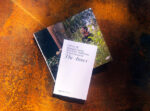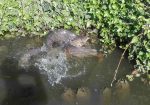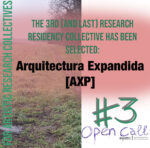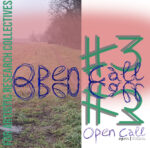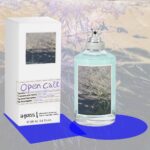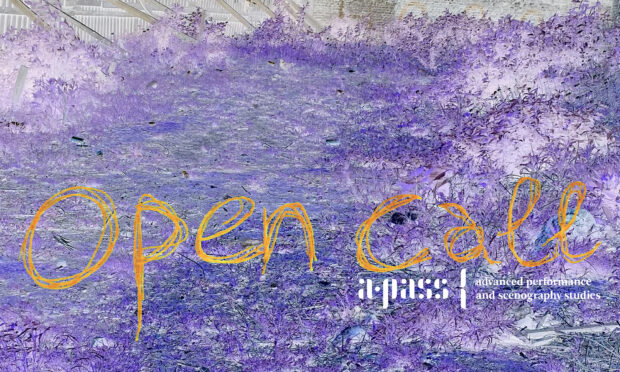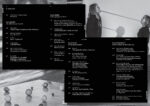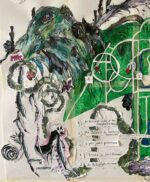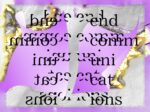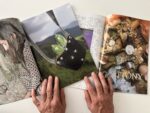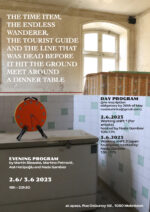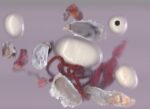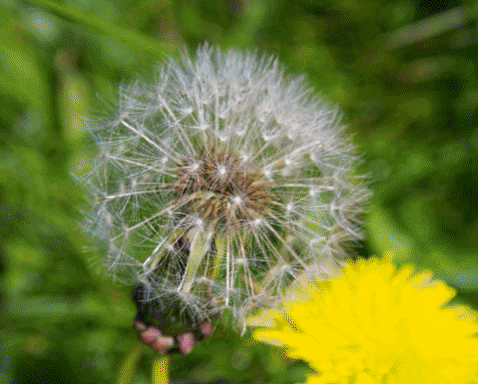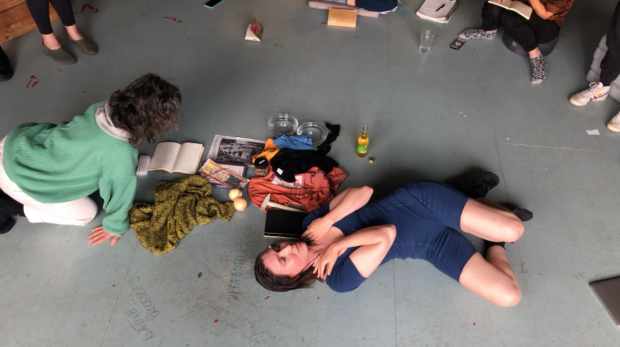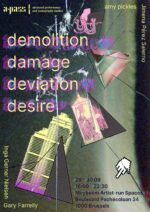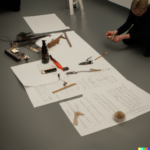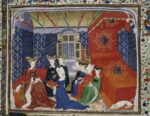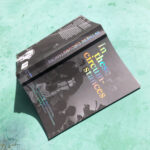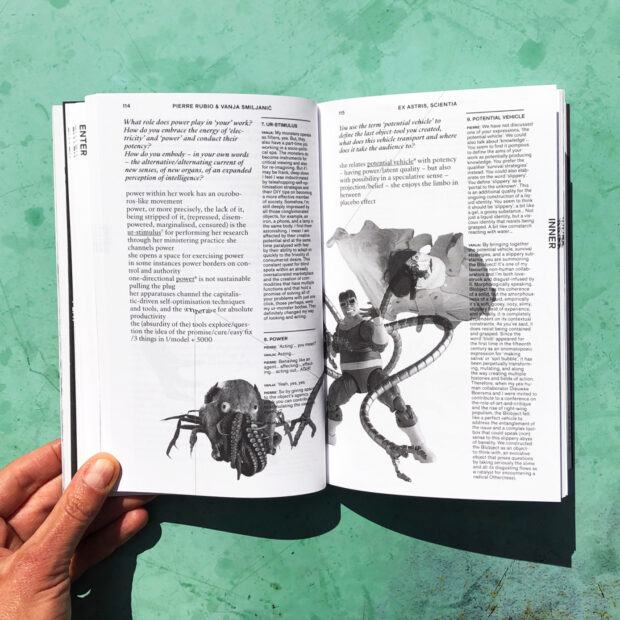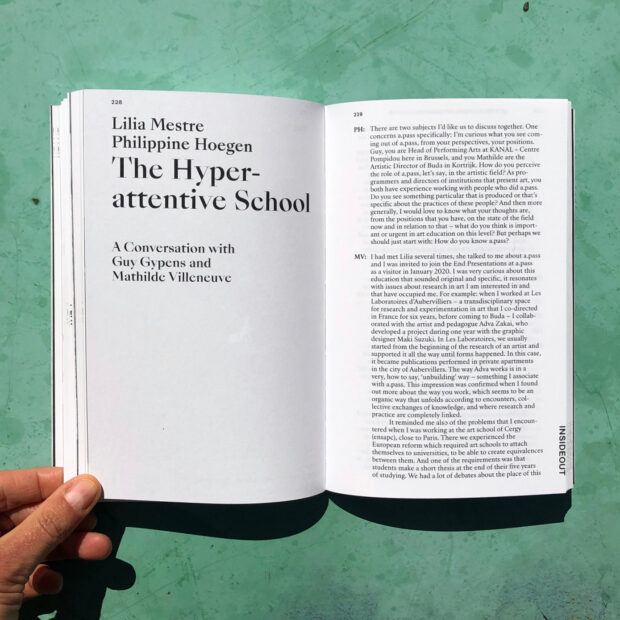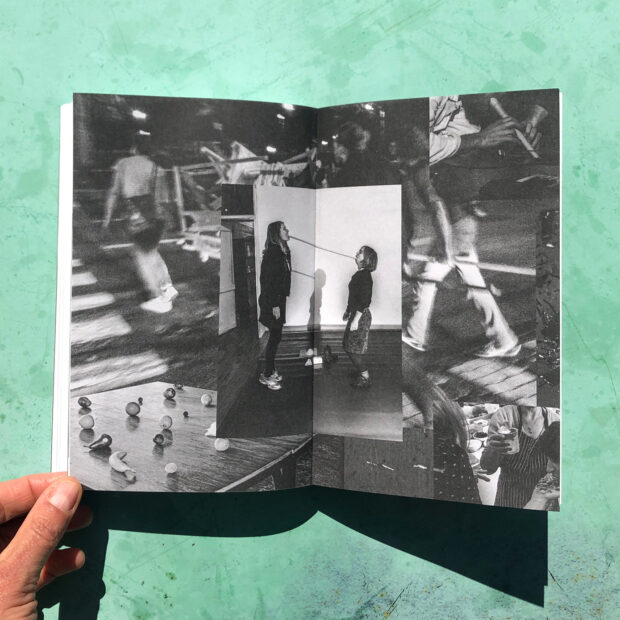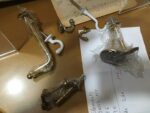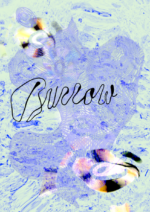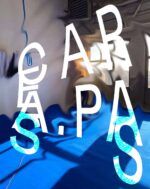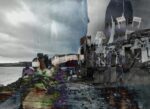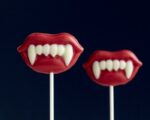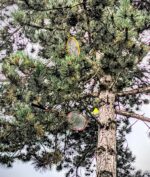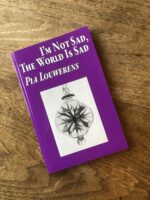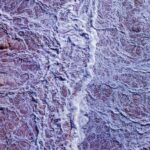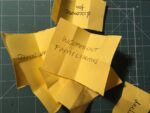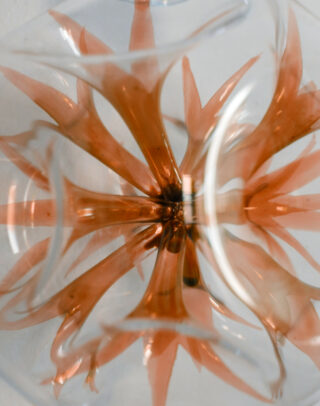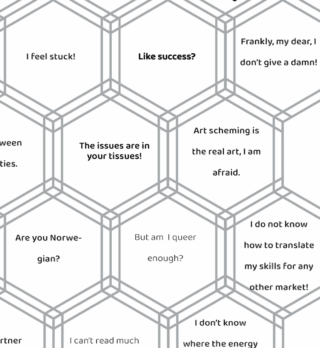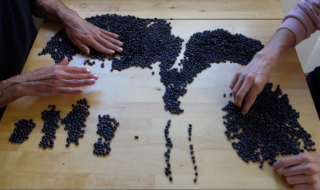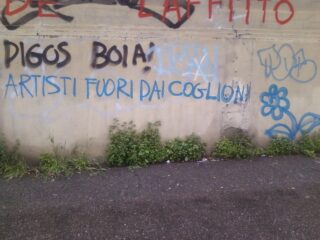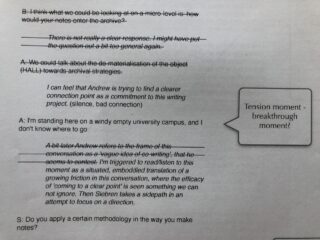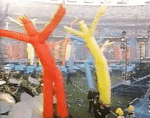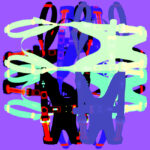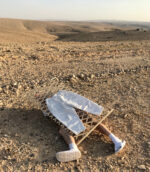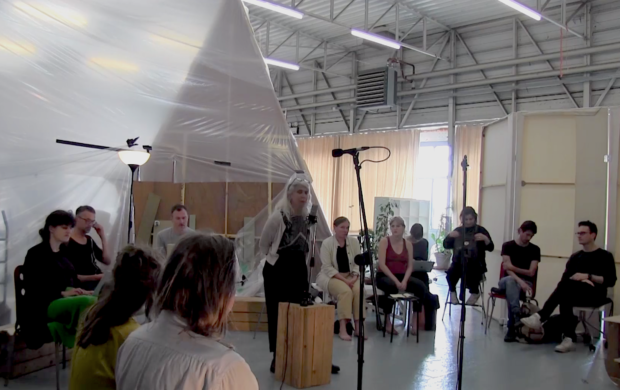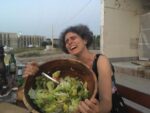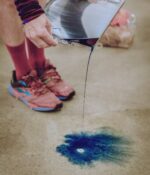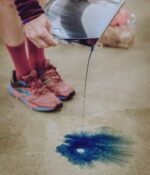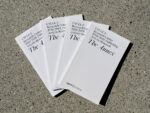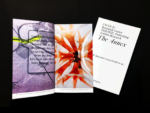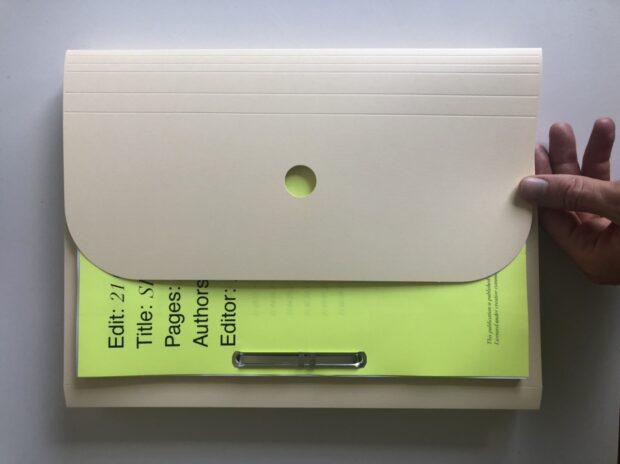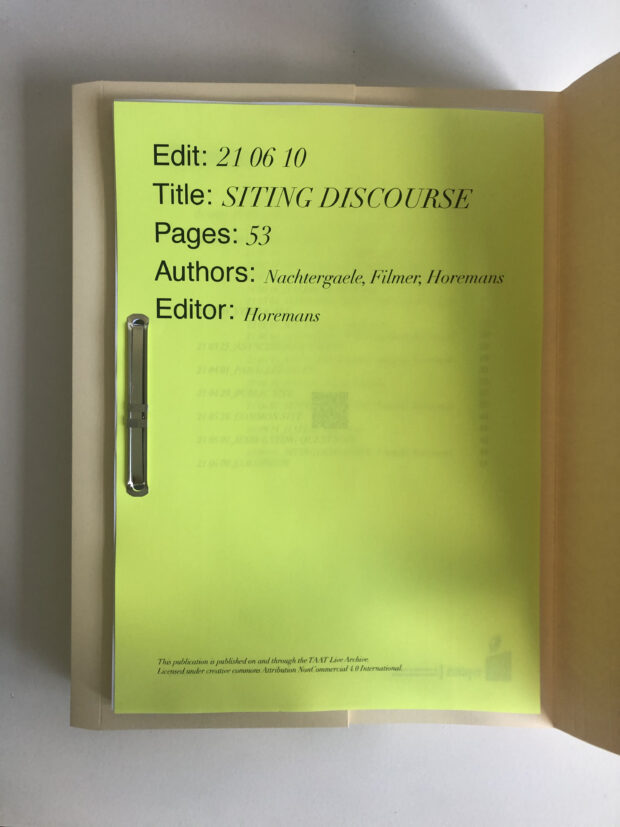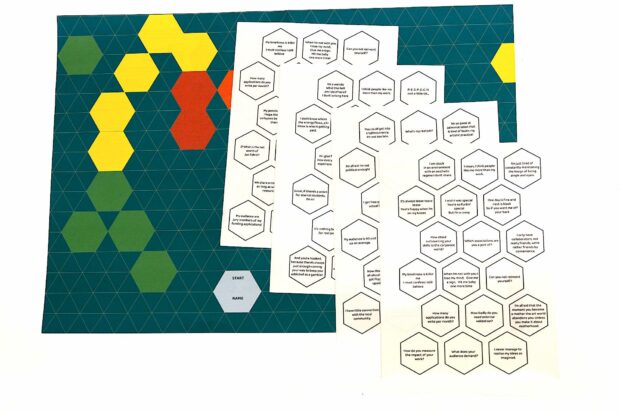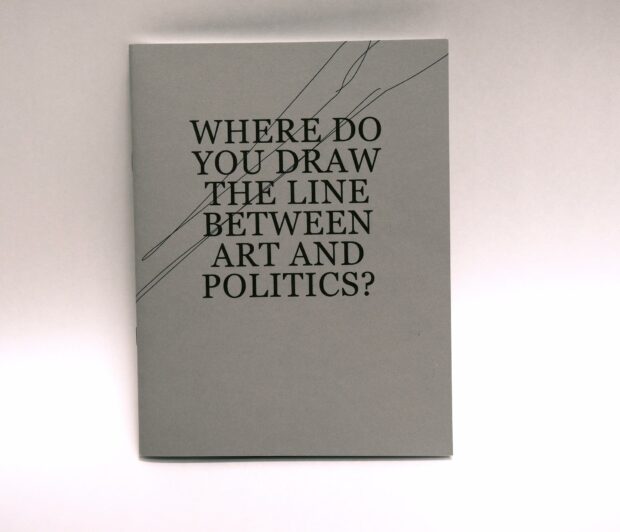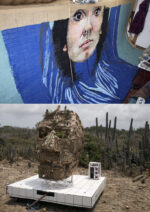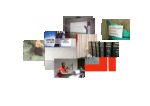Various notes from my research period at a.pass from September 2020 until January 2022.
Mentors: Myriam Van Imschoot, Tom Engels, Lilia Mestre, Mika Hayashi Ebbesen, Benny Nemer, Lisa Deml, Isadora Gallas, Amanda Piña
www.federicoprotto.com
(file: 29.08.2020)
Komische Pan Figur, sitzt vorne, Effektmikro, verschiedene Effekte, verschiedene Sprachen
ich konnte meine Models nie zahlen
ich wollte meine Models nie zahlen
ich habe meine Models nie bezahlt
-> Beichten in verschiedenen Sprachen,
bis sich die Sprachen vermischen in Klänge
bis sich die Klänge auflösen in einen klaren Ton
Ton verwandelt sich in (chorale?) Melodie
sound Pan fängt an
[“i have laboured for free!!!” (???) ]
Song Pan, - adoration of the nature (god) of things

Baumstämme around Halbkreis, wie Waldlichtung, oder viele Objekte, nicht nur Baumstämme aber Klötze und andere bulky objects, natürlich, semi-natürlich, unnatürlich in einer Art größerem Kreis, Zirkel (neue Funde Stonehenge1 als Vorlage) um eine Haufen Kleidung, gesammelt aus den Straßen Brüssels!
Eine Szene mit dieser Kleidung, Objekte werden beschrieben, teilweise unter hysterischem Lachen, Sound im Hintergrund, wie Motoren, Kettensägen, Ferraris2, stressig, Beschleunigung, Fabrik, Produktion.
Zwei Stühle oder sowas, mit high heels dran, oder zwei Stühle als high heels verkleidet, somehow, whatever, Figur sitzt drauf, lacht hysterisch, geht nach hinten, weisse Vorhänge, lang, Nähmaschinen, die Situation von Arbeit, etwas wird genäht und immer wieder von hysterischer Figur zerrissen, Arbeiter nähen es wieder zusammen,
durational
eine Chor situation sollte hier stattfinden (?).
-
“Und jetzt kommt ‘ne Strophe von Kunst:
‘The contemporary marketing of freedom and the transfer of revolutionary themes from the class struggle to the hedonistic entertainment industry and the creative industry of ideas has resulted in today's art rarely being articulated along the lines of revolutionary utopia and the emancipatory thinking of the future.’"3
(Monday, November 9th, 2020)
I would like to start these notes on my first block at a.pass with a quote I got sent by a good friend just a while ago:
“Why should our bodies end at the skin, or include at best other beings encapsulated by skin?” 4
Donna Haraway
(File: Beginning of September 2020: Presentation of research in current state)
[updated on the 1st of January 2022]
More than ever it is clear that a sustainable way of working within the field of fashion is urgently necessary. Fashion, as an industry but also as a phenomenon, poses this problem as a systemic core issue of consumerism and a capitalist value system.
Regardless of several attempts of rejecting, and boycotting the fashion system, e.g. as proposed by numerous flip-charts and out-cries by influencers on social media, the question of why to bother finding solutions seems essential. Especially facing the current events of the pandemic, dressing our bodies, transforming ourselves, and role-playing, fashion becomes key protagonists in a lock-down-every-day. But not only that, more than ever, we cover our bodies: masks start to crawl up our faces, and besides being hygienic utilities, they become a further semiotic moment of dressing, a political zone of tension.
Our lives are ruled by everyday rituals, and getting dressed is one of the main acts we are all, collectively practicing. […] So how to tackle this ecological catastrophe ‘fashion’?
[…]
This research approaches ways how to bring fashion elsewhere. Where or what could that be? Could fashion be understood as a certain kind of mode? A state of at*tention and ad*dressing? If so, what is this mode’s materiality like? What are the methods of making this frictional zone of interstice permeable?
Steinzeit Now:
Kleidung et Banana, Post-Post-Patchwork
‘STEINZEIT now’ is a string of my research stemming from a discourse circle which was first called ‘Kleidung & Banana’ […] initiated in 2016 in London with three fellow fashion design colleges and friends: Agnes Varnai, André Reiner Törner, and Wanda Wollinsky.
‘KLEIDUNG & Banana’ is a collective discursive attempt rooted in a moment of 2016 when all of us were interning for different high-end fashion brands in London (Hussein Chalayan, Marques’Almeida, J.W. Anderson). This moment emerged from not only feeling exploited but feeling like deliberately incarnating a system of exploitation of young creative and physical labor force, feeling like voluntarily embodying an absolute forced upon crisis, feeling like trapped in the paradox of neoliberalism. From the desire to rebel against and boycott this shared common reality, we founded a fictive fashion brand called ‘Kleidung & Banana’.
[…]
In 2020 we had a short revival of the practice via online-conferences during various lockdowns. One of our main concerns and conclusions was that fashion is dead. This bitter, but almost-pathetic statement produced the idea to understand the current state of fashion as a sort of pre-stone-aged momentum, and the discourse group we formed as a prophetic preparation for a 21st-century fashion-ice-age!
The proclaimed prophecy includes a manifesto of four pillars:
1 fun (recreate)
2 fuck the system (rebel)
3 cheap-ass (reflect)
4 free booze (re-conquer)
Despite that we all enjoy a drink or two at times, obviously, these four points can be understood as placeholders for methods of preparing for and surviving the upcoming ice age.
The idea is to be a fashion collective on the basis of being a fluid creative discourse circle, beginning from the wish to primarily exchange and communicate thoughts and ideas.
[…]
Moved by the idea of a current stone age of fashion and a possible upcoming world covered in ice, I set up to look into the predecessors of my methods and practices as a fashion designer: where does fashion come from, what are the history and genealogy of the tools and methods I use and practice? How can I unlearn ‘the future’ and ‘the new’ to re-learn ‘the present’ and ‘the now’?
Hence, one first experiment is a series of hand-stitched textile pieces titled ‘Post-Post-Patchwork’. Through investigating historical sewing needles, and hand sewing techniques from centuries BC, I tried to understand how a (larger) body is generated by uniting (smaller) bodies, and how one singular (body) is always multiple (bodies). I started to manically preserve every textile leftover I had, e.g. from scavenged and customized, cropped, or tattered garments collected from the streets, or leftover fabric scraps from designed pieces from previews fashion collections of mine, and interconnect these in a coincidental and raw manner.5
The resulting patchworks partly became simple flat textile pieces within the process of editing. Some others though developed into strange miss-fitting harnesses, maybe even into miss-functional porto-garments, questioning representation: not only did this practice create a fuzzy time tunnel, but also suggests an un-learning of the human anatomy, the human body, movement, performance. It trivially produced a meditative sensation of healing, a strange act of rebellion, and ultimately a clash of perspective.

Esoterikosmos
Letter for K.6
30.09.2020
Dear K.!
I am Federico, I just started 1 month ago at a.pass and ur mom told me about this work of yours with your colleges at […], I went to see your musical-holistic performance, maybe you remember me, I was the awkward stranger with glasses, hehe. Anyways, your mum told me to go and see your work bc I am a fashion designer and mentioned that you made your costumes yourself during the period you spend within the location and she also mentioned that you would perform self-written songs. The day of your performance I was in a very bad mood, I don’t even remember why, I just know that I almost didn’t go, I am glad that I went at the end. You know, I never liked saying that I am an esoteric person, I would rather say I am a spiritual, but I started to understand that ESOTERIK just means – translated from Greek – THE INNER or INSIDE – and I think that in my work there is a part which strongly wants to unfold methods and practices which help as a guide o the ‘inner world’ (maybe something like ‘ESOTERIKOSMOS’).
So from my esoteric point of view, going to your performance was very important! The day before I have been writing with a friend of mine in Berlin to maybe record a song together and she plays the Klarinette. Being in a bad mood and then arriving at that location which seemed like an exploded version of your ESOTERIKOSMOS and you playing that exact instrument I had been thinking about - I connected the dots and my mood went up, lightly. I think it is crucial to keep noticing and keep reading these small symbolic ‘signs’, at least as directional meaning (to not give them a ‘good/bad’ interpretation). You know to me they represent a path, it’s relaxing. And then passing your little group in the café the day after it again lightened my mood so I decided to write you this letter, it’s my side of reading the signs.
LONG INTRODUCTION
In my path of arriving here to Brussels and a.pass there was one event which was very relevant for this direction. It’s a trance-like meditation a woman called ANITA practiced with me. It is about finding a place of safety and love and excitement one created within oneself as a child. I think there are several of these spaces within us, for different moments of our life, your performance and the space you created seemed like one of these.
[…]
THE VOICE. The voice is something very fragile, and I feel like even using my voice for 29 years on this planet, I often still have no clue about it. It comes from within! Esp. if used as we do for singing, performing can become a shamanic practice.
It becomes a shamanic practice because the voice, spoken or sung is something coming and activated from INSIDE and it goes also inside the other things, human beings around it (and it goes through us so it can also be understood as something cleansing, cleaning out, cleaning through…) To me the voice is something which very easily becomes a magical tool (or magic itself??) and the voice used in the purest sense (whatever that may mean to each one) is – in my ESOTERIKOSMOLOGICAL understanding – the most powerful. Your voice is powerful, it is really amazing and I loved that it didn’t try to be beautiful but it just was, by being itself, raw and porous and shy.
[…] I hope one day you can hear my voice too.
I want to keep striving for the porous voices, fragility, vulnerability – not singing nice – but singing !
that’s it!!!!
[…] TBC.
BXL 8/8/2021
Dear K. Now almost 1 year after writing the first part of the letter, I got the impulse to (finally) send it to you. Reading it back I discovered a lot that is very dear to me, which has been abandoned a bit in the depth of human-time-space.
So I believe that the almost-one-year-delay in sending this letter is a relevant factor to re-connect […]. On the 16th I will sing in Volksroom and it would be awesome if you came!
[…] I am excited
FOR THE FUTURE
xoxo
Federico
Audio Guide:
Soft Post-Apocalypse of Love?
(Email to humans, end of November 2020)7
Dear fellow Humans!
Here I share with You […] the 1st volume of an audiobook series with the work-in-progress-title
‘audio guide attempt to inter-material fashion research‘
****
You will find four approaches of my artistic research on the inter-materiality of fashion in a to me quite new format, the Hörspiel (‘listening play’). The four approaches of Volume 1 are:
1 Pan & the Dystopian Tendencies
2 Vessel of Knowledge 1
3 Excerpts from ‘Notes on the Indios Charrúas’ Translation
4 Augmented Reality
****
I thank Baptiste for his euphonium contribution and Vivian for the accompanying image.
AUDIOGUIDELINK1

1 Pan & The Dystopian Tendencies
[…]
When I was visiting my father in South America in January 2016 I wrote a piece of text with the title ‘I come from different places’. That poem became the Leitmotiv of my fashion collection ‘2017 non-corporeal' and has since transcended into different forms and outcomes. It is also included in the following sound piece called ‘Pan’ I wrote and produced within the last year.
[PAN MUSIC VIDEO LINK]

Plato said – I quote out of Mladen Dolar’s Book ‘The Voice and nothing more' – that ‘[…] in order to forestall a truly apocalyptic vision – the end of civilization, a return to chaos initiated by innocuous-looking changes in musical forms - one has to impose a firm regimentation of musical matters.”8
One of the rules, “[…] the prime antidotes for combating the monster […]” was to “[…] ban polyharmonic instruments that permit free transitions among the modes, […] in particular the flute […]. The wind instruments have the vicious property that they emancipate themselves from the text, they act as substitutes for the voice, they isolate the voice beyond words. No wonder Dionysus chose the flute as his preferred instrument (remembers also Pan’s pipes, not to mention the mythical connections of the flute with the Gorgon, and so on), while Apollo decided on the lyre.”9
Pan, the ancient Greek god of nature, shepherds, and the wilderness is associated with fertility and the awakening of spring. This goatish God, relative of the Satyrs and Fauns, is playing his flutes and borrows his name to the word ‘panic’. It is of no surprise that he is understood as relative of Christianity’s Satan. The death of Pan, which is said to have happened around the year 0, also marks a Copernican twist in the world view: it is said that Jesus was only born because Pan – as only Greek mythological god – had died. This marked a shift within beliefs and also allowed the big entrance of theology into our history.
[…]
I welcome you on my journey.
****
We question materiality: what even is material? How do we store material and how do we identify material?
How do all these questions re-inform the work we are doing, the lives we are living right now?
And what is quality then? Where and how is quality being constructed? And who decides how many filters are just the right amount of abstraction needed to allow reality?10
Fashion Hypnosis
[…]
[SOUND ON machine forest]
(maybe twice, je nachdem)
you are at the place of embarkment now.
the weather,
the temperature is the one you love most.
you are embarking now.
you focus on your favorite body part.
you focus on its contact with the outside world.
it is wrapped in the material, the fabric,
you love most.
it is warm. it is cool. slippery. protecting. maybe expensive.
you chose.
you see the color which makes you feel a specific way.
you are wearing this color at this moment.
you may have smelled the wind today.
you may have sensed it, you have heard it.
you are now wearing the wind.
all around you.
the wind embraces your skin.
embraces you.
you feel the thin layer of wind between yourself and everything outside.
you consider becoming small. very small, super small, to investigate that sphere between you and outside.
you jump right into it.
mini-you jumps right
into it.
you try this for a moment
[…]
you try to remember your mother's perfume the last time you have seen her.
you are embarking now
approach the magical object you are wearing today.
it is a ring
it is a bracelet
a necklace
it is the wind
it is a building
it is a feeling
it is a memory
it is something hiding somewhere.
you think about its meaning.
What does it mean? this magical something you are wearing today
[…]
You sense the material:
cold, hard, heavy, smooth,
-
strange
[…]
you breathe and you expand your field to a comfortable size.
U expand or become small.
What is the right size?
What is your right size?
How does this size fit?
You find the right size.
You define the right fit.
You decide to carry this field along for a while.
What is inside of this field?
You fine-tune the fitting of the field
when you found a comfortable fit,
you spend time in that field.
[…]
[GONG]11
Braids
(End of March 2021)
What are ways to (en)compass all the things that emerge within me?
Abundance VS abandonment?
What emerges from this juxtaposition?
[…] I wonder what string to follow, which thread to hold on to, how do I identify the freshly and finely cut end so that it can be threatened through the needle hole?
Which strings, which thread, which yarn to weave? Into a tapestry? Into a braid? Braiding.
I like braiding.
Recently I started braiding my hair into two tails.
There is something very primordial about braiding. Through simple movement and repetition of the movement, complex shapes, structures and ornaments are constructed.
Braiding hair feels like an act of prehistoric time,
a way to adorn yourself without any adornment,
you need nothing but your hair
and something to tie
you can even fix it with the hair itself.
Interesting that Björk used the hair-braid-artworks of the artist Shoplifter for her Medúlla album cover.12
It’s an album made entirely from human voices and sounds coming from the body.
It is like choral music, polyphonic singing,
Intricate, hypnotic, trance like structures, songs, lullabies
Are made entirely from human voices and sounds coming from the body.

Just like the braid itself: sounds and in this case composed sounds, musics, created only with ‘what we got’. […]
Direction is another such thing. Directions are made through the constellation of possibilities, which way to go? Which path to follow, How to move through certain spaces, how to navigate through them? The compass is a tool that tells you which direction to go. It tells you where is North. To know where is North, we also need to know where is East, West, and South.
South East and West are essential for knowing where is North,
South, East, and West are essential for the existence of North.
I want to feel less pressure to be all-encompassing, but let all these strings, all this hair, all these voices, all these directions co-exist, I want to let them breathe.
[…]
Montevideo, Italy
(file name: HWD TEXT)
[INSERT SCREENSHOTS]
The hunted look, the haunted grace
The empty laugh that you cultivate
You fall into that false embrace
And kiss the air about her face
Who do you think you are?
The tres bon mots you almost quote
from your quiver of literary darts
A thousand or so tuneless violins
thrilling your cheap little heart
Who do you think you are?
[…]
Who do you think you are?
I close with my regards
Well I’m the red-faced gentleman
Caught in this picture-postcard
Who do you think you are?
Trying my best to make the best of your absence
Though the joke gets tired and sordid
And sea-shell hearts get trampled underfoot
Punchlines unrewarded
But even at this distance, it’s not easy to accept
The vision that I chase returns when I least expect it
I've fallen from your tired embrace
I kiss the air around the place that should be your face.13
Dear Human, [this is an ANGRY letter]
[…]
I want to show you the first source
[CONTACT MIC EXPLORATION 1]

We should be listening-generators
I think what is extremely needed is that we should learn how to listen, how to bear, how to carry, how to support, how to sustain, how to care, how to be humble, how to be ashamed, how to be real, how to surrender, how to abstain, and how to learn again - to re-learn. I think what is extremely needed is that we should learn how to shut the f*ck up.
Some voices are less relevant at the moment, some voices have been too loud and are just boring now. I think some of us might have already realized that their time to speak up 'n' out is – for now – over. And no kicking and punching will help
like an angry baby who
JUST
SIMPLY
WANTS
THE
LOLLIPOP (!)
the motherfathering lollipop is not gonna come.
Upgrade yourself.
The door is locked.
The key is lost.
A genealogically, heritagely, and ancestral connection between us and us interwoven in time-space: who was/is/will be the god*des of our adoration? And how can we actually really channel them fairly and freely?
But in fact, that’s boring, this is not about you or me, but about the interstice between us.
State of MAXIMIZED CONNECTIVITY.
Death, the Beyond, & Ghosts, the fabric for Vanitas darling: we are not eternal…
Instead let’s deal here with the stretching we should do, the swinging back and forth. […] We have to develop a new form of ancestry cult, a new methodology to celebrate the past, and thus the present to also re-open the gate to direct our magic towards the future, the ancestors we will be for somebody or something in X years. I think if you understand and internalize this idea and realize that you are meaningless just by yourself, then we are on the same page to develop this new technology, to actually reach out. At this point I am not suggesting anything, I really don’t know what could be helpful to react from here and now on but I sense in my ‘being’ - and with this, I don’t mean a simple bodily notion, that would be too easy, neither a mental or academic one, because that’s not timeless enough, but a real SENSING, like when the bass of an immense sound system in a big fat-ass Madonna-concert arena booms literally through your body, makes the hairs on your legs and arms, all over your skin stand up and shiver, you feel it in your bones, it goes something like this:
BOOM [MAKE DEEP SOUND] - that we need this ancestral-upgrade-technology!
I also feel this: I don’t know my ancestors, where are they from, what did they do in their lives, how did they die, what were their favorite places, favorite colors, foods? What were their memories, desires for the future, what did they wish for, what were their kinks, which of those could they live out, and how? What did they want for me? What do they want from me?
I offer a closer look at the second source:
[CONTACT MIC EXPLORATION 2]

So, I made a family tree, on my heritage.com. I can go back to about mid-19th century, with the AI help of this webpage, and I discovered from my father’s motherly side a couple consisting of a man called [unknown] CANAPÁ and a woman called [unknown] FRAQUI. Both surnames are considerably rare to come across today, apparently, Fraqui is a surname appearing mainly in the south of Brazil and in Uruguay. Canapá could appear as a surname in Italy. But looking at the construction of the word, especially the apostrophe on the final a, it grabs my attention. This stressing of the final vowel makes it sound phonetically quite similar to a lot of southern Latin-American words and forms of speaking appropriated from indigenous languages. Even the names of the three biggest Indigenous groups found in the area of Uruguay, namely Guaraní, Charrúa, and Chaná, bear similar phonetic attributes (even if it is not really clear if those names were imposed onto them by colonial forces or not).
[…] Believe, assumption, no historical notes found. […]. But even more so I wonder who […] are our ancestors, our predecessors? […] So that we can be here, sitting in this institution in Brussel writing sophisticated texts into our crazy techno-devices (for example those macbook laptops all around). Why did a large mass of humans decided pro religions which fix a certain kind of unknown distant spirit to rely on and, contra honoring and celebrating the real heroes: the ones who made us? How do I relate to the place I was born? How are we, foreigners, expected to relate?
[…]
Hello, my name is Federico, I am 29 years old, I was born in Montevideo, Uruguay. Against the false belief of the commune worker of Forest in Brussels that Montevideo lies in Italy and thus the falsely noted statement of my birthplace as ‘Montevideo, Italy’ in my Belgian national registration data, I can confirm that Montevideo is pretty much embedded in Uruguay and even more that it functions as its capital city.
I lived in Uruguay for about 3,5-4 years because after that, a part of my family moved to Germany. We all have Italian passports because our ancestors seemed to largely maybe have been Italians. We all have Italian passports because our ancestors seemed to largely maybe have been Romans. We all have Italian passports because our ancestors seemed to largely have maybe been Latins. Have Maybe been Greeks, maybe been Etruscans, maybe Umbrians, maybe
maybe
maybe
maybe
maybe
maybe.
…
maybe I should do a little dance at this moment, dance practices, dance pieces, and dance during performance applied by non-dancers, seems to be something very trendy at the moment, so as my background and consequently my research base on fashion, it seems that the notion of the following trend is somehow relevant, and to not contradict myself I will dance now a bit.
LUMIDEE FT SPEEDY, SIENTELO, REMIXED (max 01:30)14
[dann sich auf den teppich legen, evtl contact micro bissl den teppich abtasten, durchschnaufen]
Audio Guide: À Mon Seul Désir15
AUDIOGUIDELINK

(filename: google search designer name_deisre)
Martin
- Margiela’s brand was acquired by the OTB Group in 2002 and industry insiders were quoted as suggesting that Margiela may desire to leave due to creative differences, or simply, "A desire to enjoy his life outside the insistent glare of the fashion world.
Viv
In [the collection] ‘Too fast to live, too young to die’ mid-70’s there would be a lot of attitudes and a lot of what was to come. The desire to provoke would lead them to problems with justice for obscenity and indecency. Vivienne [Westwood] and McLaren counterattacked renaming the store ‘Sex‘, with a huge poster with pink plastic inflatable letters, and a collection inspired by BDSM and bondage. “Rubberwear for the office” featured latex garments, zippers, straps, thongs, garters, fishnet stockings, and exposed breasts. Punk was born.
Rick
Rick Owens’ desire to expand beyond the realms of fashion, into the worlds of interiors and furniture, has been well documented over the past decade.
Hussein
His wish: that anywhere – whether he changes continents, cities, jobs, loves – he could find his native land, the one where life is born, is reborn. Nostalgia carries the desire, less for an unchanging eternity than for always-fresh beginnings.
Gianni
There’s no question that Gianni Versace’s vision was crystalline, the desire he built around his collections dazzling and his commerciality indisputable (at the time of his death the designer had an estimated net worth of £362 million).
Donatella
These were clothes designed for desire, by a fashion figure as charismatic as Karl Lagerfeld or Jean-Paul Gaultier, both out of the immediate spotlight but instantly recognizable, Donatella used her energy and passion to keep Gianni’s dream alive. Today, she has nothing more to prove: Versace has remained a veritable weapon of mass seduction.
Various notes on the Indios Charrúas
Excerpt of translation of ‘apuntes varios sobre los indios charrúas’ by the Brigadier General don ANTONIO DIAZ (1861-1869?) published in a modernized version by Jose Joaquin Figueira for ‘estado mayor del ejercito, departamento de estudios historicos ‘divison historia’ in 1977.
[…]
Sheet C
[…]
I remember their stature, their colour, and other physical qualities. Their guttural and nasal way of speaking, opening the mouth very little, not even to laugh, which they never did create sounds of laughter. In times of cold, they would sit down squatting on their heels, in a row, remaining in silence or talking very slowly: generally, they would stay on horse, laying on the neck of the animal.
They lived naked, like in the state of nature, only covering their sexes with some kind of object or some ordinary cloth, the ones being very rare having a quillapí or entire cloth covering their whole body, even in the winter.
The women covered their waists in the same manner, and many, but not all of them, covered their breasts with a cloth or quillapí, tied together on its tips over the right shoulder, others made a sort of simple dress out of the same material, without sleeves, with holes for their arms; they carried their small children hanging on their backs inside a cloth with its four tips knotted in the front, forming like this a kind of bag, in which they put one or two children with heads out; the ones which had three children put the third tied in the front, and the one who had four children put the oldest of them on their haunches; other brought their smaller ones hanging on their backs and the elder ones on a horse which they themselves would carry to the right.
They would have no headgear, come along bareheaded, some of them girdling their foreheads with some rags forming a headband, some of them tied their hair with a braid.
They obeyed a chief, choosing for this position the one who received the most credit for his courage and audacity, and whose authority and no rules nor limits.
Before the Conquista, when the iron was yet unknown to them, they went to war armed with arrows, made out of flintstone, its shape resembling one of the bay leaves, but surrounded with sharp teeth in the opposite direction of the harpoon; later on, they substituted that stone with metal, which they sourced mainly from barrels, also to create spears, which they would always be armed with – same as with the bows and quiver – during peace and during wartime.
Ultimately they were very few ones keeping arrows, and most of them used spears.
Always bareback on horse, with only a simple rein, without breaks, they were extremely skilled in maneuvering the horse, same counts for their Bolas, which they would never cease to carry along on their hips.
[...]16
I AM

I am, I am, erm… I am a-, I am a…
I am clothing, I am a patchwork, I am an assembly, I am a cloth, I am fabric, I am a leftover, I am recycling, I am an up-cycling, I am a hybrid, I am a chimera, I am a monster, I am a t-shirt, I am a top, I am a shirt, I am a collage, I am M, I am S, I am XS, I am XXS, I am LARGE, I am X-TRA LARGE, I am XXL, I am XXXL, I am XXXXL, I am XXXXXL, I am6 XL,
I am XM? …. I am unique.
I am a product, I am a design, I am fashion design, I am clothing design, I am cotton, I am a packaging, I am wrapping, I am protection, I am a result, I am a solution, I am a cover,
I am actually an album, an ep, an extended play, I am a CD, I am a compact disc, a carrier of data.
I am a sleve, i am a cd sleeve, I am a database.
I am work.
I am an artwork, I am an experience.
It's 2021 and I am a non-binary object
I am a non-binary artistic object
I am a non-binary artistic body
I am a non-binary body
I am a body
*CLAP*
LIEBER GOTT IM HIMMEL,
Mach bitte, dass sich alle T-Shirts verkaufen! …
—
I am a body in space. And you are a body in space, and you are a body in spaces and you and you and you are all bodies in space, and YOU
Are a body in space who needs a new T-Shirt!

EP LINK17
Auris-Them
Dear Myriam
I had a dream, or a lucid vision a week ago.
I got into my head spiraling, thinking about how
absolutely different our entire world would be
if humans would have developed without
the eyes, without the sense of the optic
and visual.
And first, I thought, ah we would all be blind,
but oh, that's not true.
From the beginning, everything would be so different,
how we perceived each other,
what would be the idea of beauty,
how we would talk and communicate,
how we would dress,
what we would move,
technology, knowledge, wisdom, gender, art!
Myriam, I truly believe the world would be a better place if ears and skin were our main senses.
There is something very bizarre about the eyes,
They create distance.
I sense a huge circle of humans,
who managed to encircle the whole world,
because it is a ritual of proximity and love,
like a huge festivity, and they all hold hands,
almost
but not really, they have their arms stretched out and
enough distance between each other fingertips to feel the next persons
warmth and scent and small sounds of movement,
and they are wearing light bright robes,
out of some material unimaginable to us
which is thin and warm and origins
from a completely different technological approach to production.
And we hummmm, and zummmm.
Like bees, a sonic ring of humming all around the world!
Like the rings of Saturn, and this ring creates a balm for the soul for all living beings. So beautiful,
not humans but Auris-Them.
****18
Playlist
(End of November 2020)
Soft Post-Apocalypse of Love?
1 dj taunus - Hello and welcome back to Soft Post Apocalypse of Love (intro)
2 okay kaya - mother natures bitch
3 jessie ware - save a kiss
4 cookie kawaii - vibe (if I back it up)
5 abdu Ali - did dat
6 tami ti - single right now (ft juck)
7 thool - tepeu
8 Gwen stefnai - cool (dj taunts edit)
9 MC dricka - foi bate bate
10 deli girls - peg
11 Villa Elvin - Ettiquete Stomp
12 Pelada - Asegura
13 Madonna - Frozen (Hardtechno Bootleg)
14 Vessel - Paplu (love that moves the sun)
15 eurythmics - sweet dreams (medieval version by samusoridicus)
16 amar - tuhaimerasaman (federico luz edit)
17 Fleetwood Mac - dreams
18 nils bech - foolish heart 2019
19 J H Schein - 13 Suite No. 2 in D Minor (from Banchetto musicale, 1617) II. Gagliarda a 5
[PLAYLIST LINK]

1 https://earthsky.org/human-world/discovery-massive-prehistoric-circle-trenches-near-stonehenge/
2 ???
3 Lyric from the song ‘1988 Earthbound” by Federico Luz, written on9th of August 2020 in Paris, France, cites Bojana Kunst, Artist at Work, Proximity of Art and Capitalism, John Hunt Publishing, 2015, p.10
4 Donna Haraway, 1991, Simians, Cyborgs and Women: The Reinvention of Nature, London: Free Association Books. Quote sent to me by my dear friend Franziska Schneeberger
5 These post-post-patchworks finally becoming the base for the special edition release of my Federico 2021 Luz EP ‘Formulas’ in November 2021.
6 name changed
7 Wed, 25 Nov 2020, 00:59
8 Dolar Mladen, A Voice and Nothing More, Short Circuits, 2006, p.45-46
9 ibid
10 Excerpt from press text written by Anna Lugmeier & Federico Protto for the release of music video ‘Pan’ on PW-Magazine https://www.pw-magazine.com/2021/video-premiere-federico-luz-pan/
Pan by Federico Luz, Camera: Anna Lugmeier, Bo Vloors, Viktoria Bayer, Federico Protto, Edit/Concept: Anna Lugmeier, Costumes: Federico Protto, Additional Design: W<, bichofeo, Setdesign: Artemyi Shokin & Anna Lugmeier, Performers: Diana Barbosa Gil, Stefan Cantante, Anna Lugmeier, Federico Protto, Franziska Schneeberger, sound mastering: Witch Studios ?
Thanks to RENDEZVOUS3000 (Evamaria Müller, Anna Lugmeier)
11 Gong-Sound from Amanda Lear, Follow Me,1978, released on Ariola Records
12 Björk, Medúlla, released on 30 August 2004 on One Little Independent Records. Cover image photographed by Inez + Vinoodh
13 Elvis Costello & The Brodsky Quartet, The Juliet Letters, 1993, released on Warner Bros. Words, Declan MacManus & Marina Thomas, Music written by Michael Thomas
14 https://www.youtube.com/watch?v=C5stjYUK-yg
15 This title is a reference to the series of six tapestries, today called 'The Lady and the Unicorn' created in the style of millefleurs woven in Flanders around 1500
16 ‘apuntes varios sobre los indios charrúas’ by the Brigadier General don ANTONIO DIAZ (1861-1869?) published in a modernized version by Jose Joaquin Figueira for ‘estado mayor del ejercito, departamento de estudios historicos ‘divison historia’ in 1977, p.7-8
17 Open Source Font used is called Kareu Kareu designed by Isabel Motz (Velvetyne Foundry & No Foundry) and layout for Federico Luz' EP Formulas by Chloë Janssens
18 part of an email written to my friend Myriam in June 2021
Image Credits in order of appearance
Pan Single Cover, Viviane Gulacsy, 2020
Post-Post-Patchwork, Federico Protto, 2020
Arachne-Mag, Federico Protto, 2017
Video-Still Pan Music Video, Anna Lugmeier, 2019/2021
Braid Detail, Dora Denerak Galyas, 2021
Video-Still 1, Research Roulette 2021, Federico Vladimir Strate Pezdirc
Video-Still 2, Research Roulette 2021, Federico Vladimir Strate Pezdirc
'welcome to your senses', GIF from bjork[dot]com around the year 2000
Formulas Special Edition, documentation pictures, Federico Protto, 2021
Formulas EP Logo, designed by Chloë Janssens
soft post-apokalyspe of love (MIXTAPE) Cover, Federico Protto, 2020
